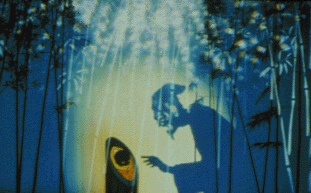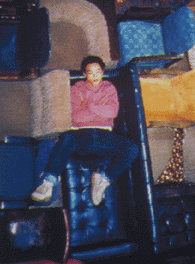Towards diversityNew strategy to popularise artBy Chloris Ho In an attempt to shorten the distance between art and the general public, the Hong Kong Arts Festival Society has adopted the tactic of diversity. This strategy was obvious in the Hong Kong ArtsFestival '98, the 25th Arts Festival held in Hong Kong. Over 30 programmes were included in the Festival, which ran from 10 February to 8 March. In addition to traditional programmes such as ballet, orchestral music, opera, painting exhibits and drama, a variety of new programmes were available. As the festival got underway, Mr. Wu Hoi Fai, assistant marketing manager of the Hong Kong Arts Festival Society Limited, said, "The Hong Kong Arts Festival is not reserved for the elite classes but for all classes. Therefore, we hope the general public will participate in the programmes.
"There is no specific theme of the Festival, as we aim at providing as many diverse, high quality programmes as possible, from forerunners to traditional forms. "We aren't forcing the public to change their attitudes towards the programmes immediately. We are trying to provide different choices and chances for them to exposethemselves to new things." One of the new programmes in the Arts Festival was EuroComics '98, an exhibition of comic strips drawn byartists from different European countries. Various comicbook themes were on display in the Exhibition Centre: social satire, modern family life, science fiction, politics, erotic adventure and black humour. The European artists were well-known in their countries. Local artists Li Chi Tak, Zunzi and Craig Au-Yeung were also invited.
"Interaction is one of our emphases in this Festival. Besides introducing outstanding performance, we also want to raise public concern for art and inspire people to ponder on the actual meaning of comics and other artwork," said Mr. Wu at the time. According to Mr. Wu, comics are regarded as art in European countries. Said he: "Comic magazines are put together with literature in libraries. We hope the public in Hong Kong can have a brief understanding of these comics' history of development. "This exhibition is an important programme in the Arts Festival. It attracts public attention partly because vulgar comics seem to be dignified," said Mr. Wu. Indeed, many visitors were driven by curiosity. Gordon Szeto, 9, went to the EuroComics '98 exhibition with his mother. "I know about this exhibition from a children's magazine. I found it attractive, so I asked my mother to take me to the exhibition."
However, they were slightly disappointed. Said Gordon: "The comic strips are different from those I have seen before. I can't understand the culture of European countries simply by looking at these art works." Another participant, Miss Lily Liu, 23, a secretary, said, "I love comics, especially the Japanese ones. As I have never seen European comics before, I wanted to know what European comics look like." Another new element in recent Arts Festivals has been concerts by local pop singers. Anthony Wong Yiu Ming was invited to hold a concert during the Arts Festival last year, and it was Eason Chan's turn this year. Mr. Wu described the concert as one of youthful programmes, which represented the diversity of the Festival. He said the emphasis on concerts was to give a perceptual sphere to the audience. "We wanted to organise the concert with fresh angles rather than making it an ordinary pop concert. "Eason Chan's concert was devoid of luxuriant packaging. He says he tries to move the audience by sharing his happy moments with them," said he.
The Japanese shadow play Tale of Princess Kaguya also attracted much public attention. According to Mr. Wu, it is a fairy tale suitable for the whole family. Local actors and a local director were invited to perform a Cantonese version so that children could enjoy it without facing a language barrier. Mr. Chung King-fai, head of the Hong Kong Academy for Performing Arts, said, "The organisers of the Festival were progressive. They invited performers from around the world for cultural interaction," said he. Miss Marie Sin, 19, a science student at the University of Hong Kong, agreed. Miss Sin has joined the Youth Friends ofthe Hong Kong Arts Festival for 3 years. She thinks the programmes of the Arts Festival have been improving. "In the past, only mainstream classical programmes such as ballet were available. But now, I can find many modern art forms in the Festival. "I can see the presence of amateur performances and totally new programmes like the comics exhibition. However, the pace of arts development in Hong Kong is so slow that it is hardly recognisable. It still has a long way to go." Miss Felice Chung, 19, a medical student at The Chinese University of Hong Kong, said efforts in diversity still will not change the public's perceptions of the Arts Festival. "If you are a lover of arts, you will participate in art-related activities no matter if there is an Arts Festival or not. But if you are not interested, nothing can push you to try." However, Mr. Wu was more optimistic about the future of arts in Hong Kong, because "the public is more likely to enjoy the arts when compared to the past". There are also signs that show art is flourishing in Hong Kong. Said Mr. Wu: "We face new competition as other organisations like the Provisional Urban Council and some private art groups organize art programmes as well. "It is beneficial from the public's point of view as they have more choices." The popularity of programmes is reflected by satisfactory box office receipts. According to Mr. Wu, 91 percent of tickets were sold in 1997. Similar tallies were expected this year. But promoters still face difficulties. Said Mr. Wu: "The main problem is that local audiences are not generous about going to the theatre. They think critically about their spare money and the programme's quality before making a decision. We have to pay extra attention to the quality of the programmes. "Our preparation work started a long time ago. We are planning programmes for the Arts Festival in the year 2000 now." Mr. Wu said there is no absolute definition of art. Most important is the audience's willingness to expose themselves to new things. "We are well prepared," Mr. Wu said.
"It is the audience's turn now." |



